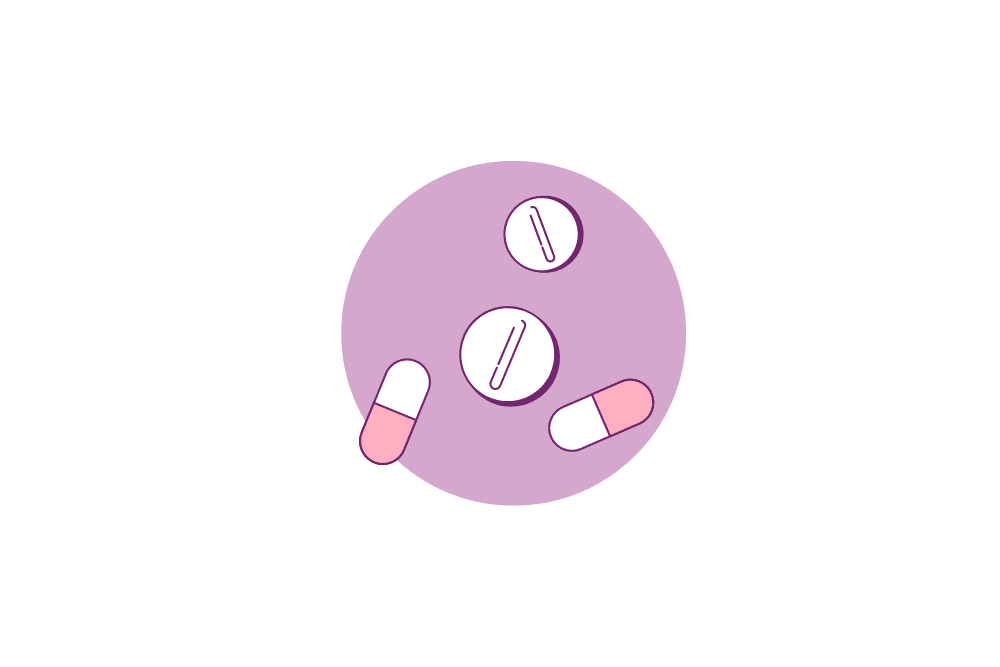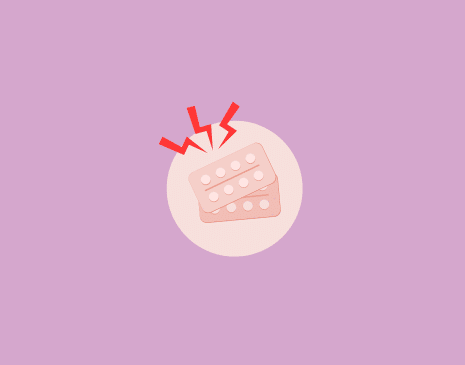Dealing with period pain can be an unwelcome monthly ordeal for many women. Whether it’s a dull ache or intense cramping, menstrual discomfort can significantly impact daily life. Fortunately, there are many period pain medications available to ease these symptoms and provide much-needed relief.
In this blog, we explore period pain medication, focusing on pills and tablets designed to target menstrual cramps and discomfort. From over-the-counter remedies to prescription options, understanding the range of available medications can empower you to find the most effective relief (ahem – the best period pain killer) for your specific needs.
Understanding Period Pain: Causes and Symptoms
Period pain, also known as dysmenorrhea, is a common phenomenon experienced by women during their menstrual periods. It can manifest as cramping, aches, and discomfort in the lower abdomen and pelvis. Understanding the underlying causes and recognising the symptoms is essential in effectively managing period pain.
Causes of Period Pain
Menstrual Cramps: These are caused by the contraction of the uterus as it sheds its lining during menstruation (hence “menstrual bleeding”). Excessive contractions can lead to pain.
Prostaglandins: Chemicals called prostaglandins play a significant role in triggering uterine contractions. Higher levels of prostaglandins are associated with more severe menstrual cramps.
Other Factors: Certain underlying health conditions such as fibroids, pelvic inflammatory disease (PID), endometriosis and adenomyosis can worsen period pain.
Common Symptoms of Period Pain
Cramping: A persistent, dull ache or sharp pain in the lower abdomen is a hallmark symptom of period pain.
Back Pain: Many individuals experience lower back pain during menstruation, which can accompany abdominal discomfort.
Headaches: Some people may also experience headaches or migraines due to hormonal changes during their menstrual cycle.
Nausea and Fatigue: Period pain can accompany symptoms like nausea, vomiting, and fatigue, further impacting daily activities.
Understanding these causes and symptoms is essential for choosing the most appropriate period pain medication to provide relief. Whether it’s over-the-counter options or prescription medications prescribed by a healthcare professional, addressing period pain effectively requires a solid understanding of its underlying mechanisms.

Exploring Period Pain Medication Options
When it comes to managing period pain, there is a range of medication options available to ease discomfort and improve quality of life. From over-the-counter remedies to prescription medications, understanding the various types of period pain medication can help you find the most suitable relief for your needs.
Nonsteroidal Anti-Inflammatory Drugs (NSAIDs)
These anti-inflammatory medicines are commonly used to relieve pain and reduce inflammation. NSAIDs work by inhibiting the production of prostaglandins, which are responsible for triggering uterine contractions and causing menstrual cramps. Examples of NSAIDs include ibuprofen and aspirin.
Acetaminophen (Paracetamol)
Acetaminophen is another over-the-counter pain reliever that can be effective in managing mild to moderate period pain. Unlike NSAIDs, acetaminophen does not have anti-inflammatory properties but can still provide relief from menstrual cramps and discomfort.
Muscle Relaxants
Healthcare professionals may prescribe muscle relaxants to alleviate severe muscle spasms and cramping associated with period pain. These medications work by targeting the muscles in the uterus and pelvic area, helping to reduce tension and discomfort.
Hormonal Birth Control
For women with particularly severe or debilitating period pain, hormonal birth control methods such as birth control pills, patches, or hormonal intrauterine device (IUD) may be recommended. These methods work by regulating hormone levels, which can help reduce the intensity and duration of menstrual cramps.
Dietary Supplements
Certain dietary supplements, such as magnesium, omega-3 fatty acids, vitamin e and vitamin B6, have been suggested to help reduce period pain when taken regularly. These supplements may help regulate hormone levels and reduce inflammation, leading to decreased menstrual discomfort.
Over-the-Counter Relief: Best Pills and Tablets for Period Pain
Over-the-counter (OTC) medications offer convenient and effective relief for mild to moderate period pain. Nonsteroidal anti-inflammatory drugs (NSAIDs) are widely recommended for their ability to reduce pain and inflammation associated with menstrual cramps. Some over-the-counter pain relievers are available, providing pain relief without anti-inflammatory properties.
Antispasmodic medications can target muscle spasms and cramping, offering further relief. Herbal remedies, heat therapy (heat packs), and dietary supplements may also complement medication-based approaches for managing period pain. Following the recommended dose and consulting a healthcare professional if unsure which option is most suitable is essential.
Additionally, considering alternatives like a tens machine, which stands for transcutaneous electrical nerve stimulation, can provide additional relief and complement traditional medication methods. A tens machine works by delivering small electrical impulses through electrodes placed on the skin, which can help alleviate pain by interrupting or blocking pain signals sent to the brain. It’s a non-invasive and drug-free option that many find effective in managing period pain.

Prescription Medications for Severe Menstrual Cramps
In cases of severe menstrual cramps that are not adequately relieved by over-the-counter medications, healthcare professionals may prescribe stronger medications to provide period pain relief. Here are some types of prescription medications commonly used for managing severe menstrual cramps:
Prescription-Strength NSAIDs
While NSAIDs are available over the counter, prescription-strength versions may be recommended for individuals with more severe period pain. These medications provide stronger pain relief and anti-inflammatory effects, helping to relieve intense cramping and discomfort associated with menstruation.
Hormonal Birth Control
Hormonal birth control methods, such asbirth control pills, patches, injections, or hormonal intrauterine devices (IUDs), are commonly prescribed to help regulate menstrual cycles and reduce the severity of menstrual cramps. These methods work by altering hormone levels, which can help prevent ovulation and reduce the production of prostaglandins responsible for causing uterine contractions.
Gonadotropin-releasing hormone (GnRH) Agonists
GnRH agonists are medications that work by suppressing the production of oestrogen and progesterone, thereby inducing a temporary menopause-like state. By reducing hormone levels, GnRH agonists can help alleviate severe menstrual cramps associated with an underlying condition such as endometriosis or adenomyosis. However, they are typically used for short-term management due to potential side effects and long-term implications on bone health.
Antidepressants
Certain types of antidepressant medications, such as selective serotonin reuptake inhibitors (SSRIs), may be prescribed off-label to help manage severe menstrual cramps. These medications can help modulate pain perception and improve mood, providing relief from both physical and emotional symptoms associated with menstruation.
Opioid Analgesics
In rare cases where other medications have been ineffective in controlling severe menstrual pain, healthcare professionals may prescribe opioid analgesics for short-term pain relief. However, due to the risk of dependence, tolerance, and potential side effects, opioids are typically reserved for severe cases and used cautiously under close medical supervision.

Finding the Right Medication for Your Menstrual Pain: Factors to Consider
Finding the most effective medication for managing menstrual pain involves considering various factors that can influence treatment outcomes. Here are key considerations to help you find the right medication for your menstrual pain:
Severity of Pain
Assess the severity of your menstrual pain. Mild to moderate pain may be effectively managed with over-the-counter medications, while severe pain may require prescription-strength options or other interventions.
Specific Symptoms
Consider any additional symptoms you experience during menstruation, such as bloating, headaches, or nausea. Some medications may target specific symptoms in addition to pain relief, providing more comprehensive relief.
Underlying Health Conditions
If you have underlying health conditions such as endometriosis, fibroids, or pelvic inflammatory disease (PID), discuss your symptoms with a healthcare professional. They can recommend appropriate medications or treatment strategies tailored to your specific condition.
Medical History
Consider your medical history, including any allergies, sensitivities, or previous adverse reactions to medications. Certain medications may not be suitable for individuals with specific medical conditions or medication interactions.
Preferences and Lifestyle
Take into account your personal preferences and lifestyle factors when choosing a medication. For example, you may opt for heat therapy or dietary supplements if you prefer non-medication-based approaches. Also, consider factors such as convenience, ease of administration, and potential side effects.
Hormonal Factors
Hormonal fluctuations throughout the menstrual cycle can influence pain perception and treatment efficacy. Hormonal birth control methods may be particularly beneficial for individuals with hormonally related menstrual pain, such as premenstrual syndrome (PMS) or dysmenorrhea.
Consultation with Healthcare Professional
Consult with a healthcare professional, such as a gynaecologist or primary care provider, to discuss your menstrual pain symptoms and treatment options. They can provide personalised recommendations based on your needs and help you navigate the selection process.
By considering these factors and working closely with a healthcare professional, you can find the right medication to manage your menstrual pain effectively and improve your overall quality of life. Communicating openly with your healthcare provider and following their guidance is essential to ensure safe and effective treatment outcomes.









